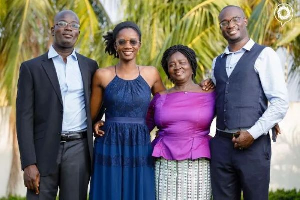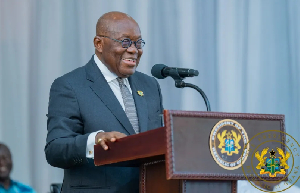Black Love, Sarkodie’s new album, because of its underlying rhetoric, instantly invites comparison with Mary, his other collection on amour. Let's save you the stress. Black Love pales, the reason being as follows:
Whereas Mary, co-conspired by ex label–mate Akwaboah, dwells within the savoury highlife locale that is the favoured love language by many a Ghanaian songwriter, this new offering takes a more populist route; a scrupulous pursuit of dance tempo, and a sweeping assemblage of pop architects with the target of perpetuating radio reign.
Put differently, tinker out a pair of passable verses, tap a popular singer for hook duty, and leave the rest to the acreage of your own fame.
Enter Efya, KiDi, Kuami Eugene, King Promise, Sista Afia, Bisa KDei, Idris Elba, and Donae’O.
Moreso, it’s Afrobeats season. When in doubt, feature Nigerians. Hence, the album, fifteen tracks long, abounds with the voices of famous singers, particularly this last group. On hook after hook, the listeners are inundated in the spirited croons of the Lagos forum (Rudeboy, Mr Eazi, Tekno, Kizz Daniel, Maleek Berry) — chewing over the lottery of love, luxuriating on lust, ruing acidulated fondness.
The album may contain within it another con, in how much of it sounds like a single song; the result of, perhaps, a lack of ingenuity on the part of MOG, who enjoys a long working relationship with the rapper, and a large share of production credit on Black Love. Songs like “Lucky,” “Do You,” “Broken Heart,” “Feelings,” and “Saara,” due to the identical finish on the drum kicks therein, as well as parallel melody arcs, all struggle to achieve sonic uniqueness, even if they cater to in-demand BPMs.
As singles, the songs on Black Love have a fighting chance. The album’s auteur is, after all, a strong force in the singles market, currently sitting atop with offerings like “Oofeetso” and “Year of Return.” As a collection, though, the project suffers an imagination deficit, lacking all traces of the rule-breaking bravado one would expect of Ghana’s foremost rhymester.
How an artist achieves this results — on his sixth album — is the real mystery.
The flushes of genuine promise on Black Love are supplied by, well, a singer who literally has “Promise” as part of his name. The charming Nungua native, who is currently Ghana’s go-to hook man for the love song, shows up on two songs on the collection; first; the radiant “Anadwo,” whose erotic tenderness is driven home by percussion that invoke the sensation of waist beads, which are the ultimate seduction tool in the culture of this town, as well as comely string and saxophone treatments; and second, the epiphanous celebration on “Can’t Let You Go,” the album’s lead single whose visuals document Sarkodie’s momentous wedding to partner Tracy, which likely set the project’s tone.
Another might be “Strength of a Woman,” which, though initially fails to supply convincing groove, is salvaged by Stonebwoy by the time the chorus arrives.
“Womba,” and the Donae’O and Idris Elba-aided “Party & Bulls#!t” which are the album’s concluding tracks, might harbour trump card character too, presenting unique, polar merits. While the latter possesses instant strike due to familiar sonic motifs and high-profile guests, the former, featuring the young Herman Suede, and Shakka, enters earworm district over multiple plays.
Today’s closing argument is this: it is inevitable for an artist of Sarkodie’s repute, assigned fifteen songs, and multiple A-list collaborators for a project to not make an impression. As to whether or not it ripples conversations on long-lasting bodies of works — which is the real metric for measuring Africa’s most decorated rapper — is another question.
Click to view details



Entertainment of Saturday, 18 January 2020
Source: enewsgh.com

















